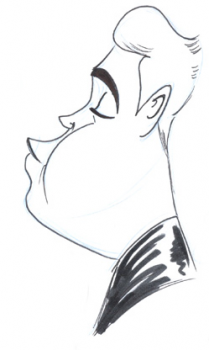The Seven Steps to Getting a Job in Television
by: Alan McKee / Queensland University of Technology
I run the Bachelor of Creative Industries (Television) at Queensland University of Technology. Our students want to work in the industry, and we give them a class called (with due deference to the decades of R and D conducted by the public intellectuals working in the self-help movement, who discovered the importance both of ‘steps’ and of the number seven) ‘The Seven Steps to Getting a Job in Television’. They are as follows.

What does that mean, exactly? Tell me – from start to finish – what a typical day ‘working in television’ involves? When are you going to get up? What are you going to do when you get in to work? Who are you going to be working with, and what kind of interaction will you be having with them? And the next day? And the next day?
Every year, dozens of students arrive in our degree, convinced they want to work in television. And yet their behaviour as they study makes me suspicious about what they think that actually means. They don’t like being bored – they won’t come to lectures if they are boring. They don’t like doing menial work. They don’t like taking responsibility for things, or having to work things out for themselves. Which makes me wonder – what exactly do they think that jobs in television involve? If you love television, then making a television program is a wonderful, exciting, rewarding, challenging thing to do. But that doesn’t change the fact that much of the time, most jobs in television are just that – jobs. Like any other jobs, they involve long periods of doing dull, repetitive or menial work. The vast majority of the people in the production office are doing precisely the kind of work that student usually hate. Cataloguing tapes. Printing out contracts. Filing paperwork. Doing research. Paying invoices. Updating databases. There’s a lot of sitting around doing nothing. There’s a lot of answering phones, or chasing people for their ABN numbers. Working out petty cash. Making tea and coffee. Phoning bookshops to find copies of out of print books, or haberdashery stores to find stocks of discontinued material. Typing names and contact numbers for a hundred people.
So – bearing that in mind – do you think that you want to work in television? Can you do these jobs? Can you do them with commitment, knowing that it’s part of creating a TV program? Can you do them with passion, knowing that you’re learning about the nitty gritty of how to run a production? Can you do them for many years?

Our Television degree is doing well. The first group of students graduated in February this year, and already several have jobs in television. These are entry level jobs – as production assistants, researchers, runners and tape loggers. This is how things work.
One of the problems with traditional Film and Television degrees is that they train students to want to be directors. That’s a fine ambition. But two points. Firstly, you will not, and should not, emerge from Film School straight into directing. No matter how good your degree, there’s still a lot of learning about the industry to be done – particularly if you want to make something more than just an art film. There’s no way that you’ve run anything to the scale and scope of a mainstream television or film production. And secondly, an industry can’t survive only on directors. You need hundreds of other people doing other jobs, just as important, just as creative in a variety of ways. You need production assistants and runners and line producers and executive producers and editors and key grips and camerapeople and lighting assistants …
This doesn’t mean that a university degree is useless. Our students graduate with a series of vocational skills – a solid understanding of how the industry works, technical skills, research and writing skills, communication skills, knowledge of the laws that impact on television production, the history of successful TV programs … All of these are useful. They will serve them in good stead as they progress in the industry. But they still have to start at the bottom and work their way up. And it is quite right and proper that they do so. The skills and knowledge we give them will help them to work their way up, and may even let them do it a bit more quickly. Accepting this fact is vital if you want to get into the industry. And it will help you with the next step.

Producers have told me that they hate people who come into the industry telling everybody who’ll listen ‘I really want to be a director’, and give the impression that doing the everyday work of running a production – answering phones, keeping databases updated, filing invoices, making coffee, doing the lunch run – are beneath them. If that’s your attitude, you’re not going to get anywhere. Doing such work is a vital part of learning – the everyday logistics that hold a project together. And more than that, it’s a vital part of getting yourself into the industry. Television projects are massive logistical exercises, which bring together huge numbers of people in complex, almost military-style organisations. For each new program, and each new season, new crews are put together. They are highly structured, but also flexible organisations. And when they’re putting their crews together, people tend to choose crew that they know, or who are recommended to them by people that they know – people that they trust, and know will do the job well. That is something that you have to earn for yourself in the industry. Again, a University degree can be useful here. This is particularly the case if your teachers have earned the trust of people in the industry. I am commonly asked for recommendations of students to take up television positions. Whenever this happens, without exception, I always recommend the students who have worked hard, been enthusiastic and friendly, who work well in a team, and who have a good attitude.

So you know you want a job in television, and you’ve got the attitude that you’re going to have to start at the bottom. How do you get in there?
The most important thing is to meet people. This will already be obvious from the previous point. It’s all about networks. You need the people who are looking for crew to know that you exist. How are you going to meet them? Again, a relevant degree can be useful – if it’s the right degree, and you are being taught by, introduced to, and generally meeting, people in the industry. And if your lecturers know people in the industry. Secondly, don’t underestimate the importance of your fellow students in this process – the first one who gets a foot in the door then knows about you if the company has to take on an extra receptionist. Thirdly, find ways to make contact with and get involved with industry bodies – in Australia, think about SPAA Fringe (Screen Producers Association of Australia). Fourthly, get involved with Community television – it’s a separate sector, but as well as gaining experience and skills, there is some crossover (in Australia, see Blokesworld, Rove).
And more than this – you also need to meet people in the creative industries outside of the television industry – because television is a voracious consumer of content, and it’s always bringing in new creatives. Musicians, animators, fashion designers, graphic artists, performers – the more people that you know, the more chance that somebody you know at some point is going to get asked to do something on a television program. Go out every night and do something. And be nice to everybody you meet and smile and chat. Don’t be fake, obviously. Just enjoy people’s company. Look for what’s interesting about them and ask them about it. Find the local networks for creative people – email lists, organisations local venues, festivals, events – and get involved.
You will also quickly learn to spot people who actually have talent and get things done on the one hand; and losers who just complain about how nobody recognises how great they are on the other hand. Focus your time and energy on the former; but don’t alienate the latter. Sometimes talentless people will get into the TV industry, and it doesn’t do any harm to keep them onside.

Don’t wait until somebody employs you. Right now you should have creative projects running. You probably can’t make your own TV programs – that takes a lot of money and people. But get involved in creative projects. Ideally, not just doing things by yourself – making short experimental videos, drawing pictures or writing poetry are fine, but they don’t help build your networks or project management skills. Much better are projects which involve other people, and which have public outcomes. Again, community TV is good. So are film festivals, and comedy galas, and fashion events, and dance parties. Organise an art show, or a performance event. Shoot a music video for a local band or put together a music festival. Something that’s creative, and involves people, and allows you to build your own networks, and show your initiative and leadership skills and ability to work as part of a team, and inspire people and organise things, and actually make things happen. Plus, harking back to the previous points, it lets you meet lots of new people, who may at some point get work in the industry, and remember how great you were.

Which brings me to a more general rule. Once you are in the industry, in an entry-level position – show, don’t tell. Don’t go around telling everybody you meet how talented you are, and how you’re going to be a great director, and the industry is fucked, and you’re going to fix it, and you’re only doing this Production Assistant job until you get your big break. It may be true – but telling everybody about it isn’t going to do any good. Nobody’s going to say, ‘Oh, Alan just told me he’s a great director. I had no idea– we should let him direct the shoot next week’. Rather, what you need to do is show people how good you are. Do this by excelling at everything you’re asked to do – and by sometimes going a little bit further. Initiative is a hard one. Because television is a massively complex machine, with hundreds of people all interacting, there’s a necessary and rigid hierarchy of decision-making. For each decision in the process of making a television process, from the biggest – who to cast in the lead role – through hundreds of intermediate decisions – what colour of paper to use for which draft of the scripts – to the most minor – what to have for lunch – it’s somebody’s job to make that decision. So you can’t really just decide things for yourself and go off and do them. But sometimes you will see ways to show initiative – do more than is asked of you, produce the outcome you were asked to do but more quickly and cheaper than was expected, offer an idea to a discussion. People will notice that. And if you have previous work to show – you’ve produced a comedy gala, you’ve organised a series of dance parties – not only will you have the skills and networks from that, but you have those successes to show. Remember – there’s nothing less interesting or impressive than somebody with lists of great plans of things they’re ‘going to do’, when they’ve never actually done any of it.

The capstone, the key, the one thing you mustn’t forget. It follows on logically from all of the points above, but it still surprises me that some students don’t follow it. Whenever you get any opportunity to do anything in television or related to television, do it. Whatever it is. Even if isn’t paid.. Even if you have to do night shifts. Even if you have to drive for two hours every day each way, or sleep on a friend’s floor. Even if you have to teach yourself to drive. If you want to work in television, this is what you will do. Whatever the opportunity – take it, energetically, and with a smile. Because this is how you will meet people, and that is how everything happens. And do it all with a great attitude.
There you go, simple really. Follow the seven steps, take it seriously, live, work and breathe television for years and years of your life, and go for it.
Good luck.
Image Credits:
3. Arrogance.
7. Intern grasping every opportunity
Please feel free to comment.
I think these rules are adaptable to any field, and are very useful guidelines. Most entry-level positions, in all fields, are a bit painful, but you’re going to have to pay your dues someplace. The advice about creative projects is particularly pertinent — and it’s also indicative of how valuable it can be to work for free sometimes. Connections gotten from volunteer labor putting together events can be highly bankable.
An excellent post which I shall point to on my own blog. Here in the United Arab Emirates the ‘attitude’ issue is even more extreme. It’s not just that TV wannabes seek to start their careers as directors, in our territory they go out and set up their own channel!
Number of satellite channels broadcasting from Dubai Media City – about 250 and rising.
Number of truly competent makers of television in Dubai Media City – about 200, butr most of them are working for just 4 of the channels!
Thank you! This will be required reading in my film classes where the “I am going to be a director” mentality runs rampant. Often I don’t even think it’s really because they all want to be directors, but because they just don’t know about all the other jobs that go into making films and television programs. And this is because they don’t have experience. I really appreciate the way you break it down here. Amen!
Good to see your getting on well Alan.
Best of Luck.
Well played Alan…well played.
Yes Alan, good to see you are learning in your new job.
More insightful reports to come I hope.
It appears from certain spellings of your words you’re not from America so, in the spirit of sharing, here’s a few more:
Be able to lift heavy objects without complaint
Pick a big wig to be loyal to
Research and follow that money!
Learn as many media production & transmission formats as possible
Gracefully and manipulatively kiss lots of ass with a purpose
Don’t be Black
Don’t be female
This is indeed a nice message and anybody who wants to get into the industry should always have it at the back of his mind or is already in the industry. it’s great.
I love the message to all standards and everybody in and yet to enter the industry should have it at the back of their minds.
I wanna work in tv shows..! Please give me some tips,, and I have the confidence to work on television..!
Hi.. iam a 33 year old female although most people would think i look more in my early 20’s.. originally from iraq but came to Australia when i was 8 years of age. I dont look like a typical iraqi girl (arabian girl) iam actually a blonde green/bluish eye white girl that loves making people laugh and is very talkative with a very high selfesteem and love to learn and share my knowlage and experiences with people around.. so iam defnitly a “people person”.. iam a mother of 4 and most people dont believe that when they do meet me and look at me “no way!!..” i get in respond.. lol! Well, i sure am a proud mother of 4 gorgeous children all under the age of 10. Iam one rare and beautiful gem in accordance to what people say when they meet me. I guess its a good thing. I have always loved to do something on television.. i have always had ideas- great ideas of how to involve myself in television.. i just needed to meet some one/people who is willing to meet with me that works in television. Iam one bubbly, beautiful blonde with lots of interesting experiences.. iam currently studying the bachelor of psychology and speak, read and write arabic very well but would really love to work in television.. please advice if any recommendations?? Iam also very good at marketing and promotion.. Thank you dearly in advance!
Ps- I live in Australia, Melbourne.
Citizen of Australia :-)
I want to be a tv model
I want my trailer mavie get in the Tv
I wanna work in TV serial I am married n 29yrs n proud mother of 1 child good looking n more typical person n very chill always wanna enjoy my life I am from Bangalore I completed my 12std n very good house wife plus n I had very good family n very proud inlaws I have acting ka kidda from. Childhood n wants to act in TV serial always my dreams never comes so I wanna join know I would like to work I never did anything in my life so plss give me some advice so that I can join for any acting thanking you …
I wanna work for tv media !
I would join this
I wanna work for TV
Sibongile Gwala a 23 year old young female who stays in Durban who is looking for a job in tv media, because I love acting simply because it requires me to shift from my comfort zone of being who i am and take another person’s character more of putting mymyself in another person’s shoes. I’m a hard worker, I don’t easily let go or throw the towel in closing i am capable
A great article from a long time insider! You combine greatly your passion for tv with loads of common sense! Thanks a lot, I totally agree with the comment above of this info being useful for any industry =)
I love this ❤️
I ALSO WANT TO BECOME AN ACTOR
I ALSO WANT TO DO WORK IN TV
My hobby is acting
Thank you 😊
Why not?
I’m so far from being classed as an arrogant person
I’m hard working. Never done this before. Family and friends say I’m a lovely, caring, kind, generous person
Xx
I am also want to become an actress
So please help me.
Interested , work with TV industry as a fresher .
Acting
I want to become a TV presenter and I am willing to work hard and put my sweat, blood and tears to get a job like that
You’ve never attempted something on the magnitude and scope of a major television or film production. Second, an industry cannot exist solely on the backs of directors. Hundreds of additional people are required to perform other tasks that are equally vital and innovative in a variety of ways.